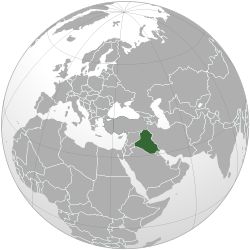Escalation Of Crisis In Iraq: What Next?
By JTW
By Kenan Engin
Since the US-withdrawal from Iraq approximately 500 Iraqis have been killed across the country. This is the highest death and casualty toll in the past five years. The recent attacks have mostly occurred in Shiite neighborhoods and intensified a sectarian tension between Sunnis and Shiites. This tension flamed up with the recent conflict between Sunni Arab Vice President Al-Hashimi and Shiite PM Al-Maliki and has turned into a political crisis. Al-Maliki has accused Al-Hashimi of assisting a terrorist car bombing supposedly aimed to assassinate Al-Maliki. For that reason an arrest warrant has been issued against Al-Hashimi after which he fled to Kurdistan. This has agitated Al-Hashimi and Sunni Arab members of parliament who blame Al-Maliki’s political tendency to dominate power centers, rule extra-constitutionally, and deny the rights of Sunni federated regions as in the case of Kurdistan.

Most Middle East analysts assert that political tensions have created an unstable security situation making Iraqis more vulnerable to violence, an assertion confirmed by the statistics of the Ministry of Interior. The number of deaths over the past month has been higher than all but one month last year.
There are three main considerations how to explain what is behind this tension.
First, most of the analysts hold the political path of Al Maliki and his agenda of power concentration responsible which rest on two columns: The consolidation of his constituency’s influence on domestic politics the drafting of a new foreign policy (e.g., toward Turkey) that will help him to strengthen his political position at home. This has been particularly opposed by Sunnis because they argue that he has exercised his control over the government and by acting as a head of all the security ministries (defence, interior and national security) has used his power to award top-ranking positions to his allies which contributes to a widespread corruption in Iraq.
The gradual exclusion of Sunnis from political power and finally the arrest warrant against Al-Hashimi have instilled Sunnis with a growing sense of non-representation which is seen as a trigger of sectarian violence.
Secondly, the recent attacks have also raised the question whether Al-Qaeda regains power after it was meaningfully weakened in 2008. Recently, it has announced on its website that it’ll push back the increasing influence of Iran on Iraq. On the one hand the concentration of attacks in Shiite neighborhoods makes this a reasonable possibility, but on the other hand, as many experts suggest that Al-Qaeda no longer controls relevant military power to organize such attacks because it has not been able to smuggle as many fighters into the country as in previous years.
Third and the worst assumption is that those attacks have been organized with the involvement of Iraqi security forces. The rise of political and ethnical rivalries in the government and between top-officials of armed forces has induced a crisis of confidence among different groups. That is why some officials and security forces have supposedly cooperated and given assistance for attacks, in order to reduce power of their rivals.
To sum up, whatever the main reason presumed for tension and increased attacks, political climate of extreme divisions and uncertainty have escalated across Iraq and have threatened stability. If the recent political turbulence does not calm down, it is possible that the Sunni militant groups with the affiliation of Al-Qaeda carry out sophisticated sensational attacks. It may also lead to the Kurds separating from the central government and declaring an independent Kurdistan.

It is only about six weeks of US troops depature
that Iraq has seen such unprecedented violence and deaths. But it perhaps doesn’t come totally with surprise. It was expected and US never wanted these Al Maliki groups to win who are allied to Iran. It couldn’t have been prevented.
However it has and will taint US for entering that place forcibly and being a party to such mayhem.
Unfortunately it is a universal mindset of the radical Islamist groups who are difficult to forget while discussing this regional religious violence.